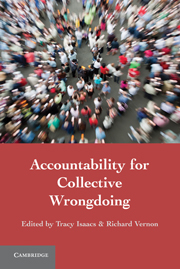Book contents
- Frontmatter
- Contents
- List of Contributors
- Acknowledgments
- Introduction
- PART I COLLECTIVE ACCOUNTABILITY IN INTERNATIONAL LAW
- 1 Collective Responsibility and Postconflict Justice
- 2 State Criminality and the Ambition of International Criminal Law
- 3 Punishing Genocide: A Critical Reading of the International Court of Justice
- 4 Joint Criminal Enterprise, the Nuremberg Precedent, and the Concept of “Grotian Moment”
- 5 Collective Responsibility and Transnational Corporate Conduct
- 6 Collective Punishment and Mass Confinement
- PART II DISTRIBUTING ACCOUNTABILITY
- Index
- References
3 - Punishing Genocide: A Critical Reading of the International Court of Justice
Published online by Cambridge University Press: 05 June 2012
- Frontmatter
- Contents
- List of Contributors
- Acknowledgments
- Introduction
- PART I COLLECTIVE ACCOUNTABILITY IN INTERNATIONAL LAW
- 1 Collective Responsibility and Postconflict Justice
- 2 State Criminality and the Ambition of International Criminal Law
- 3 Punishing Genocide: A Critical Reading of the International Court of Justice
- 4 Joint Criminal Enterprise, the Nuremberg Precedent, and the Concept of “Grotian Moment”
- 5 Collective Responsibility and Transnational Corporate Conduct
- 6 Collective Punishment and Mass Confinement
- PART II DISTRIBUTING ACCOUNTABILITY
- Index
- References
Summary
The crime of genocide deserves punishment, but should natural persons be punished for a crime that requires an organized, political structure? The Nuremberg legacy and creation of international criminal courts since the 1990s suggests that people should be punished for genocide. Is this legacy preventing the international community from considering alternative sanctions? Should states be sanctioned for the crime of genocide? What institutional changes would be necessary to punish states for crimes such as genocide? This chapter probes these questions through a critical reading of the February 2007 judgment from the International Court of Justice (ICJ) concerning the responsibility of Serbia for genocide in Bosnia and Herzegovina.
My answer is that states should be subject to punishment for the crime of genocide, but this necessitates understanding how states are corporate agents and then recasting the international legal order such that these agents can be formally tried and sentenced for the violations they commit. In the first part of the chapter, I review the distinction between collectives and corporations through an engagement with other chapters in this volume, arguing that the former cannot be punished in the way that the latter can. The next section examines the logic underlying the ICJ decision to support the point that states qua corporate entities should be subject to punishment. Although the ICJ did not hold Serbia responsible for genocide in this particular case, they did affirm that states can be held responsible for genocide.
- Type
- Chapter
- Information
- Accountability for Collective Wrongdoing , pp. 92 - 118Publisher: Cambridge University PressPrint publication year: 2011
References
- 4
- Cited by

